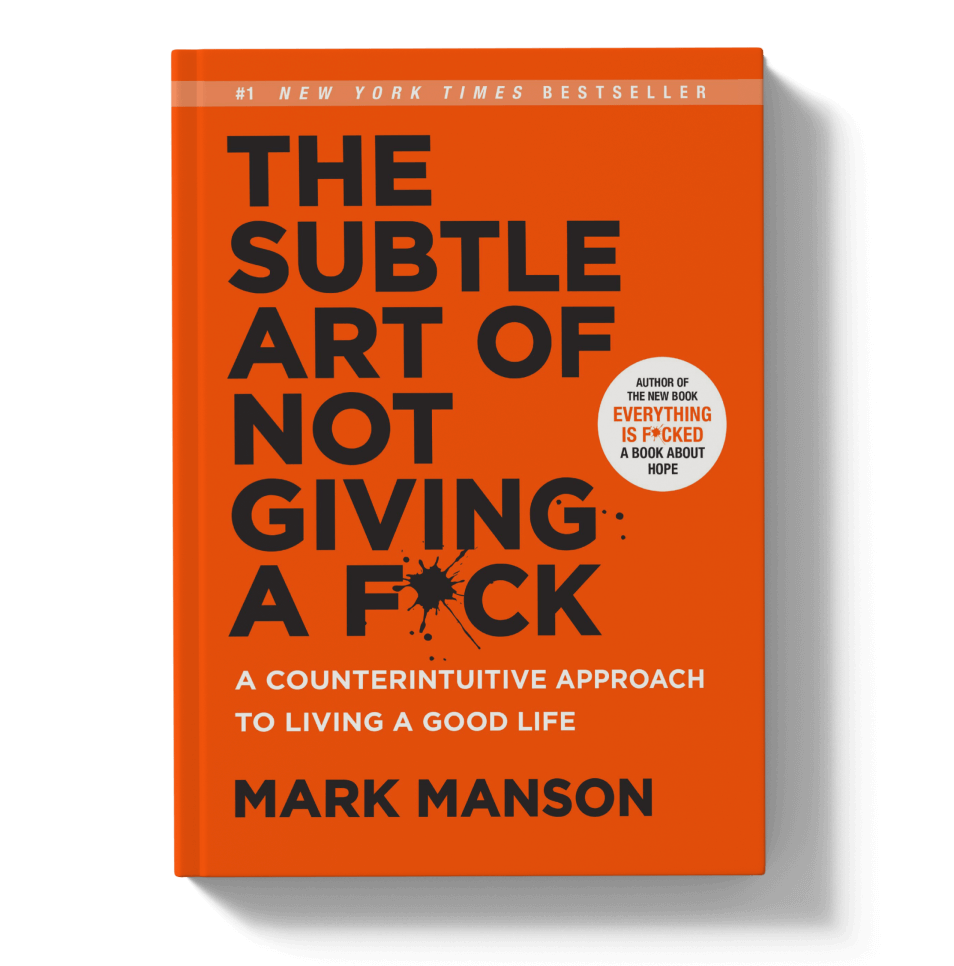The Subtle Art of Not Giving a Fuck: A Counterintuitive Approach to Living a Good Life* by Mark Manson is a self-help book that challenges conventional wisdom on happiness and success. Manson, a blogger and entrepreneur, offers a candid, humorous, and often irreverent perspective on how to lead a more fulfilling life by focusing on what truly matters and letting go of what doesn’t. The book is organized into nine chapters, each addressing a different aspect of his philosophy. Below is an extensive summary of the key ideas and principles covered in the book.
1. Don’t Try
Manson begins by dismantling the cultural obsession with positivity and success. He argues that our society’s constant pursuit of more, more happiness, more wealth, more achievement, actually makes us more anxious, dissatisfied, and unhappy. Instead of trying to always be positive, Manson suggests that we accept our flaws, limitations, and the inevitable discomforts of life. He advocates for embracing our insecurities and failures, rather than trying to avoid them, as a pathway to true contentment and authenticity.
2. Happiness is a Problem
The author contends that the pursuit of happiness is inherently flawed because happiness itself is not a permanent state. He introduces the “Backwards Law,” which states that the more we seek to feel better all the time, the less satisfied we become. Manson argues that pain and suffering are inevitable parts of life, and instead of avoiding them, we should choose what pain and suffering we are willing to endure to achieve our goals. By choosing our struggles, we give life meaning.
3. You Are Not Special
Manson critiques the culture of exceptionalism, the idea that everyone should strive to be extraordinary. He argues that believing we are special or deserving of special treatment leads to entitlement, narcissism, and a sense of inadequacy when reality doesn’t meet these inflated expectations. Instead, Manson encourages readers to embrace being “average” and find satisfaction in the ordinary aspects of life. The focus should be on what you value and choose to prioritize, rather than trying to stand out or be exceptional.
4. The Value of Suffering
Manson emphasizes that our values determine how we interpret and respond to the challenges in our lives. He asserts that many of us have poor values, such as seeking constant pleasure, needing to always be right, or seeking approval from others. These poor values lead to destructive behaviors and emotional instability. To live a better life, Manson advises readers to adopt healthier values, such as honesty, vulnerability, and responsibility. By choosing better values, we can give a fck about the things that genuinely matter and stop giving a fck about things that don’t.
5. You Are Always Choosing
This chapter focuses on personal responsibility and the power of choice. Manson argues that we always have a choice in how we respond to the circumstances in our lives, even when we cannot control what happens to us. He encourages readers to take responsibility for their choices and to recognize that their responses to life’s challenges are within their control. Accepting responsibility is empowering because it allows us to own our choices and learn from our mistakes, rather than blaming external forces.
6. You’re Wrong About Everything (But So Am I)
Manson challenges the notion of certainty and argues that we should embrace doubt and uncertainty. He explains that human beings are inherently flawed and often wrong in their assumptions and beliefs. Instead of rigidly clinging to our beliefs, we should remain open to new perspectives and be willing to change our minds. Growth and self-improvement come from recognizing our limitations, acknowledging our mistakes, and being willing to learn from them.
7. Failure is the Way Forward
In this chapter, Manson presents the idea that failure is an essential part of growth. He argues that the fear of failure often prevents people from taking action and that failure is actually a necessary component of learning and success. Manson introduces the “Do Something” principle, which suggests that action, even a small, imperfect step, creates motivation and momentum. By embracing failure and viewing it as an opportunity for growth, we can overcome fear and build resilience.
8. The Importance of Saying No
Manson discusses the importance of boundaries and the power of saying “no.” He argues that to give a fck about the things that truly matter, we must learn to stop giving a fck about things that don’t. This involves setting clear boundaries, prioritizing our time and energy, and being willing to disappoint others if necessary. By saying “no” to unimportant things, we create space to focus on what genuinely adds value to our lives.
9. …And Then You Die
In the final chapter, Manson confronts the reality of death and its role in giving life meaning. He suggests that accepting our mortality can help us focus on what truly matters and make meaningful choices. The inevitability of death should inspire us to live authentically, pursue what we genuinely care about, and let go of trivial concerns. Manson encourages readers to find something greater than themselves, whether it’s a cause, a passion, or a mission—to invest their time and energy in.
Core Principles of the Book
- Choose What to Care About: You cannot care deeply about everything, so you must consciously choose where to invest your emotional energy. Focus on values and pursuits that align with your true self and bring you meaning.
- Embrace Pain and Discomfort: Growth and improvement often come from pain and failure. Instead of avoiding discomfort, accept it as an inevitable part of life and use it as a tool for self-improvement.
- Accept Your Limitations: Recognize that you are not perfect and that life is not always fair. Accept your flaws and limitations, and focus on what you can control.
- Cultivate Healthy Values: Discard values that lead to unhappiness and adopt ones that promote growth, connection, and authenticity. Values like honesty, responsibility, and humility are more likely to lead to a fulfilling life.
- Practice Mindfulness: Stay present and avoid overthinking about the past or future. Focus on what you can do today to improve your situation.
Conclusion
The Subtle Art of Not Giving a Fuck is a refreshing take on self-help that encourages readers to let go of societal pressures, embrace their flaws, and focus on what truly matters. Through humor, candidness, and a bit of tough love, Mark Manson guides readers toward a more meaningful life by teaching them to care less about the superficial and more about what genuinely brings them joy and fulfillment.







